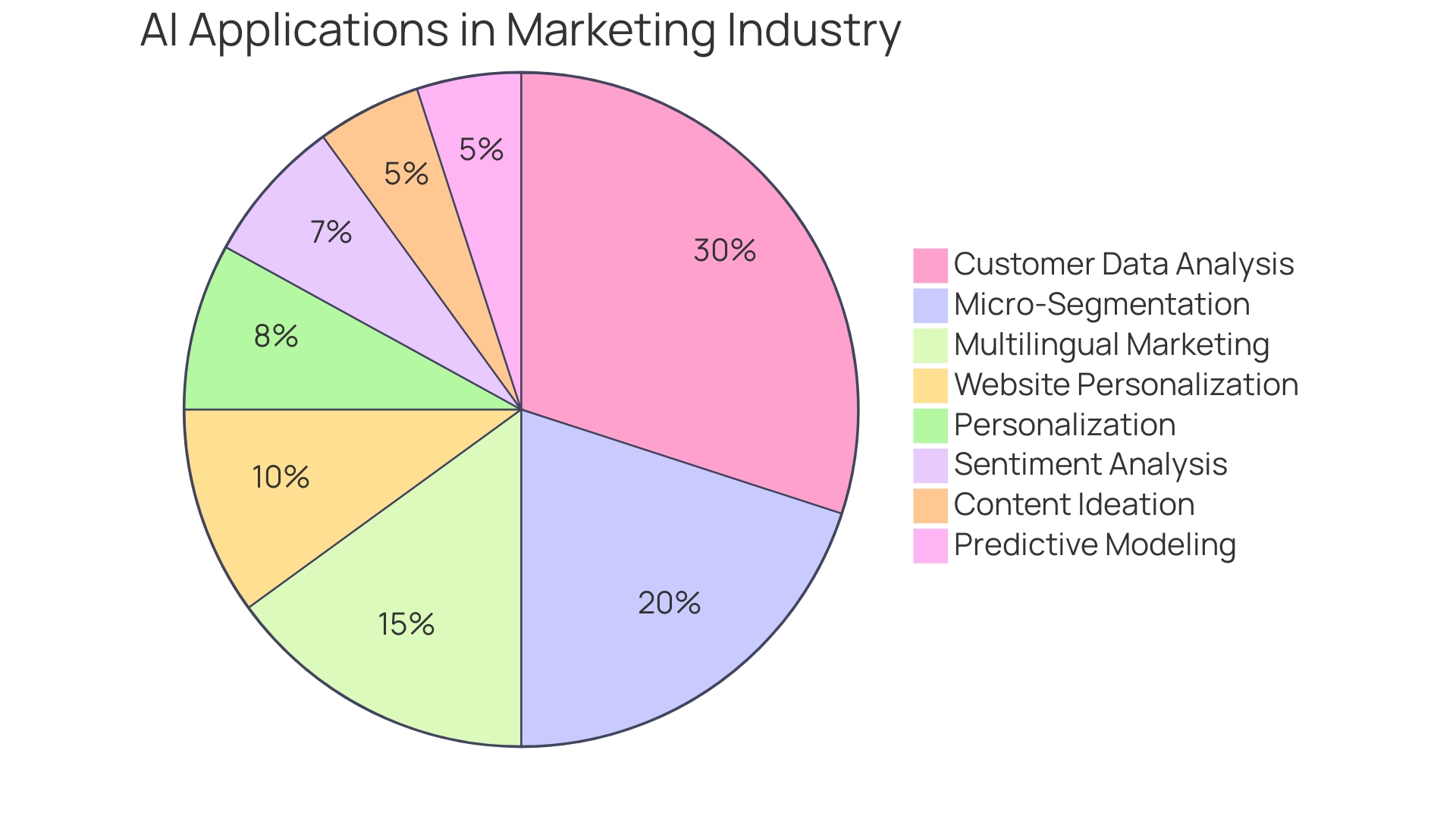Introduction
In the realm of modern business, the integration of artificial intelligence (AI) is not just a luxury but a strategic imperative. Custom AI solutions, in particular, stand out as they are finely tuned to address the unique challenges and goals of a company.
This article explores the need for tailored AI solutions, the benefits they offer, and compares them to off-the-shelf solutions. It also delves into the transformative impact of custom AI in fields such as medical imaging and marketing. With a focus on expertise and authoritative advice, this article sets out to guide businesses in understanding the importance of custom AI solutions and their potential to revolutionize various industries.
The Need for Tailored AI Solutions
In the realm of modern business, the integration of artificial intelligence (AI) is not just a luxury but a strategic imperative. Custom AI solutions, in particular, stand out as they are finely tuned to address the unique challenges and goals of a company. Take the case of Holiday Extras, the European travel extras leader.
They leveraged ChatGPT Enterprise across their organization to address multilingual marketing needs and enhance customer support. Their approach exemplifies how custom AI can scale to meet diverse demands, underpinning a data-driven culture that empowers even non-technical employees to harness data for decision-making. The development of AI solutions with scalability in mind, known as AI@Scale, is crucial.
Wintershall Dea's approach to creating a standardized environment for data access and collaboration is a testament to the importance of such a strategy. Meanwhile, small and midsize businesses are tapping into the potential of AI to amplify their marketing efforts, with more than half using AI tools for content creation across social media and email campaigns. This not only boosts creativity but also drives sales volume, according to a study by Constant Contact.
Custom AI solutions offer several advantages, including long-term cost savings and scalability. They also foster knowledge building within the organization and provide superior control over data integration. A custom solution can be a competitive differentiator, offering unique capabilities not available to competitors.
As AI continues to shape the future of customer experience, it is clear that a personalized, human-centric approach is key. According to research, AI can enhance customer satisfaction by supporting more personalized interactions and aiding human employees to provide better service. With a strategic, custom AI implementation, businesses can transform their operations and customer engagement, positioning themselves at the forefront of innovation and customer satisfaction.

Custom ML Models vs. Off-the-Shelf Solutions
Facing the choice between custom machine learning models and pre-built AI solutions, businesses must weigh their unique needs against a backdrop of dynamic market demands. Custom ML models, built from the ground up, provide the flexibility to be trained on specific datasets, ensuring highly accurate and relevant results. These models can be fine-tuned to align with the intricate requirements of a business, as seen with Amazon Rekognition Custom Labels, which allows for precise identification of objects within images tailored to a company's needs.
Consider BigBasket's experience, where their in-house ML algorithms for computer vision struggled to keep up with an ever-expanding inventory. The necessity to frequently train models to recognize new products underscored the challenge of scalability and cost-efficiency. Similarly, online retailer Wayfair uses machine learning to parse through a vast array of products, utilizing descriptive tags to enhance search relevance for items like a 'modern yellow sofa,' showcasing the importance of a system that understands and adapts to a company's catalog.
While pre-built solutions can offer immediate deployment with lower upfront costs and built-in support, they lack the customization and competitive edge that comes with a tailored solution. In the long term, custom-built AI can lead to cost savings and scalability aligned with a company's growth trajectory. Furthermore, developing AI solutions internally builds valuable technical expertise and intellectual property.
The landscape of AI is rapidly evolving, with multimodal data becoming the norm and models processing complex information in real time. As the industry advances, the decision between buying and building AI solutions isn't always clear-cut. A hybrid approach, combining off-the-shelf products with custom elements, may provide the bespoke functionality needed to thrive in today's competitive environment.
Benefits of Custom AI Solutions
Custom AI solutions are not just a trend; they are a transformative force in business. For instance, imagine an AI like Lindy, which has been programmed to handle a diverse array of tasks, from medical scribing to customer support. To function efficiently, Lindy had to be integrated with a vast network of apps and services, a process that would have taken a year if developed from scratch.
Instead, by leveraging existing platforms like n8n, the timeline was significantly reduced, allowing for a timely market entry and a robust service offering. This epitomizes the agility and efficiency that custom AI solutions can bring to a business. In the realm of AI development, the decision between using an open-source model or creating a new one hinges on time and cost.
When data is abundant, creating a specialized model is ideal but costly. Conversely, with medium to large data sets, fine-tuning an existing model is more cost-effective and can be done quickly. For limited data scenarios, in-context learning and retrieval-augmented generation are often the best strategies.
This flexibility is crucial for businesses to adapt their AI systems as they grow, ensuring that the AI continues to evolve and improve. In terms of performance, recent comparisons between new models and open-source counterparts have shown that the accuracy of data retrieval can vary significantly across different language families. This highlights the importance of choosing the right AI solution that can handle the specific nuances of your business data.
Moreover, when scoping AI projects, it is critical to understand the end-user's needs, as this will determine the direction of the AI solution's development. Kathrin Dufour of Wintershall Dea suggests that a standardized environment is key to successful AI development, as it facilitates easier collaboration within and outside the organization. Ultimately, the investment in custom AI solutions is justified by the enhanced precision, integration, and scalability they offer, positioning them as a strategic asset for any forward-thinking business.
Comparative Analysis of AI Algorithms in Medical Imaging
Custom AI solutions are revolutionizing the field of medical imaging, enhancing the way healthcare professionals diagnose and treat diseases. Take BoneView, an application designed to automate the initial detection of bone fractures in emergency departments.
As noted by a healthcare specialist, this innovation allows AI to conduct the first assessment, potentially during off-hours, with radiologists providing a subsequent review. The application serves as a second pair of eyes, significantly improving the quality of assessments.
The integration of AI in medical imaging extends beyond acute care. Complex assessments, such as interpreting pulmonary radiographs, benefit from Ai's meticulous analysis, which reduces the likelihood of overlooked anomalies.
This dual-review system ensures a higher standard of patient care. AI's impact is also financial, with the global market for contrast agents like gadolinium reaching up to $2 billion in 2023.
AI can help reduce reliance on such agents, which carry risks and inflate healthcare costs. Moreover, the diagnostic imaging market is set to grow, with AI-related revenues predicted to exceed $1.2 billion by 2027.
In the context of data management, AI automates tasks, enhances accuracy, and speeds up turnaround times for medical imaging reports. Advanced solutions like ENDEX™ intelligently separate images by body parts, ensuring only relevant data is processed by AI algorithms. This not only boosts efficiency but also lowers hardware costs and fosters a comprehensive data storage and retrieval system. AI-driven technology, when paired with human expertise, expedites treatment and elevates the quality of care. It's a critical investment for healthcare providers aiming to meet the surging demand and prevent escalating costs. As the volume of healthcare data grows, the need for AI to assist in early detection and disease prevention becomes more urgent. For example, early detection could prevent up to 80% of sepsis deaths, showcasing the vast potential of AI in transforming medical imaging and patient outcomes.

Custom Vision Image Analysis Comparison Table
Evaluating custom AI solutions, particularly for image analysis, requires a meticulous approach, considering factors such as accuracy, speed, and scalability. For instance, LandingLens, a cloud-based vision platform, exemplifies the efficient processing of complex tasks like shelf share calculations in retail.
This AI-driven approach not only saves time but also enhances accuracy in determining a product's prominence on store shelves. Similarly, in the mining sector, Minsur employs AI Custom Vision to distinguish key image features, even with a limited dataset to begin with, proving the adaptability and efficiency of custom AI in extracting actionable insights from visual data.
Recent advancements, like Panasonic's development of an AI with a sophisticated classification algorithm, underscore the importance of handling diverse data characteristics and improving recognition accuracy. This is crucial for applications that extend into new territories where conventional AI might struggle with the variety of appearances within a category.
Moreover, the importance of fairness and bias-free algorithms has been highlighted by research using datasets containing both human-captured and AI-generated images. This ensures that the Ai's decision-making process is transparent and objective, which is vital in fields where the consequences of misclassification can be significant. In conclusion, the incorporation of custom AI solutions into business operations must be done with a comprehensive understanding of their capabilities. By carefully analyzing comparison tables that weigh different factors, companies can select the most fitting AI solutions, thereby optimizing results and maximizing return on investment.
AI Applications for Marketing
Custom AI solutions are transforming the marketing industry by enabling businesses to analyze extensive customer data, discern patterns, and customize marketing efforts. For instance, Holiday Extras, a European travel industry leader, utilized ChatGPT Enterprise to enhance innovation and address multilingual marketing challenges, as noted by Annette Reuther, Head of Growth (Europe).
Their approach exemplifies how AI can overcome the hurdles of scale and data fluency across international markets. Furthermore, Ai's capacity for micro-segmentation, previously a cost-prohibitive strategy, now plays a pivotal role in fostering brand loyalty and engagement, with executives anticipating a 9% surge in customer satisfaction within three years due to generative AI.
This evolution in marketing is not just about automation of tasks like email marketing or social media posting; it's about achieving operational excellence and alignment across various business functions. AI enables a data-driven culture that supports departments, even traditionally qualitative ones like design, to adopt a more metric-focused approach, as highlighted by David Norris, Chief Growth Officer at Holiday Extras. As the capabilities of AI expand, especially with generative AI, marketing teams can now swiftly execute website personalization and harness its power for tasks such as content ideation and sentiment analysis. The marketing industry is on the cusp of another transformative era, with Ai's influence extending to personalization and predictive modeling, opening up a world of possibilities for those willing to embrace this technology.

Conclusion
In conclusion, custom AI solutions are imperative for modern businesses. They offer scalability, cost savings, and superior control over data integration.
Custom AI provides a competitive edge by offering unique capabilities and enhancing customer satisfaction. When comparing custom ML models to off-the-shelf solutions, businesses must consider their unique needs.
While pre-built solutions offer immediate deployment, custom-built AI leads to cost savings and builds valuable technical expertise. In the field of medical imaging, custom AI revolutionizes healthcare by improving diagnosis and treatment.
It automates tasks, enhances accuracy, and reduces reliance on costly contrast agents. When evaluating custom AI solutions for image analysis, factors like accuracy, speed, fairness, and bias-free algorithms must be considered.
Custom AI excels in processing complex tasks efficiently. In the marketing industry, custom AI enables businesses to analyze extensive customer data and customize marketing efforts. It fosters operational excellence and enables a data-driven culture. Custom AI solutions are transformative forces across various industries. They offer scalability, cost savings, competitive differentiation, improved patient outcomes in healthcare settings, efficient image analysis capabilities, and customized marketing strategies. By embracing custom AI strategically tailored to their needs and goals, businesses can position themselves at the forefront of innovation while delivering exceptional experiences to their customers.





